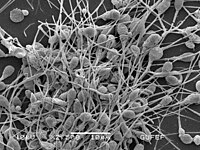animalcule
Jump to navigation
Jump to search
English
[edit]Etymology
[edit]Learned borrowing from Late Latin animalculum (“lowly or small animal”) + English -cule (diminutive suffix). Animalculum is derived from Latin animal (“animal; living creature”) + -culum (diminutive suffix);[1] and animal from animāle, the nominative neuter singular of animālis (“animate, living; relating to living creatures”), from anima (“breath; life; soul, spirit”) (ultimately from Proto-Indo-European *h₂enh₁- (“to breathe”)) + -ālis (suffix forming adjectives of relationship). The English word is analysable as animal + -cule.
Pronunciation
[edit]- (Received Pronunciation) IPA(key): /ænɪˈmælkjuːl/
Audio (Southern England): (file) - (General American) IPA(key): /ˌænəˈmælˌkjul/
- Hyphenation: ani‧mal‧cule
Noun
[edit]animalcule (plural animalcules)
- (physiology, historical) A sperm cell or spermatozoon; also, the embryo that was formerly thought to be contained inside a spermatozoon in a fully developed state. [from 17th c.]
- 2001, David M. Friedman, “The Gear Shift”, in A Mind of Its Own: A Cultural History of the Penis, New York, N.Y.: The Free Press, →ISBN, page 76:
- [Antonie van] Leeuwenhoek's most mysterious finding was yet to come, however. Inside the animalcules in the thickest part of the semen he saw / all manner of great and small vessels, so various and so numerous that I do not doubt that they be nerves, arteries and veins. …
- (zoology, archaic) A microscopic aquatic animal, including protozoa and rotifers. [from 17th c.]
- 2011, John Jeremiah Sullivan, “La·hwi·ne·ski: Career of an Eccentric Naturalist”, in Pulphead, New York, N.Y.: Farrar, Straus and Giroux, →OCLC, pages 212–213:
- If we are part of nature, then we are synonymous with it at the metaphysical level, every bit as much as the first all-but-inorganic animalcules that ever formed a chain of themselves in the blow hole of a primordial sea vent.
- (obsolete) A small animal. [16th–20th c.]
- 1831, Thomas Carlyle, “Pause”, in Sartor Resartus: The Life and Opinions of Herr Teufelsdröckh. […], London: Chapman and Hall, […], →OCLC, 2nd book, page 137:
- Why, there is not a Man, or a Thing, now alive but has tools. The basest of created animalcules, the Spider itself, has a spinning-jenny, and warping-mill, and power-loom within its head: […]
- 1928 February 25 – March 3, Arthur Conan Doyle, “When the World Screamed”, in The Professor Challenger Stories […], London: John Murray, […], published [1952], →OCLC, page 555:
- Is it not evident that if a parasitic animalcule desired to call its attention it would sink a hole in its shell and so stimulate its sensory apparatus?
Synonyms
[edit]- animalcula (used as a singular noun) (archaic)
- animalculum
Hyponyms
[edit]Derived terms
[edit]- animalcular
- animalculine (obsolete, rare)
- animalculism (historical)
- animalculist (historical)
- animalculistic
- animalculous (archaic)
- caminalcule
Related terms
[edit]- animalcula (used as a singular noun)
- animalculum
Translations
[edit]sperm cell or spermatozoon — see spermatozoon
embryo that was formerly thought to be contained inside a spermatozoon in a fully developed state
microscopic aquatic animal, including protozoa and rotifers
|
References
[edit]- ^ “animalcule, n.”, in OED Online
 , Oxford: Oxford University Press, December 2022; “animalcule, n.”, in Lexico, Dictionary.com; Oxford University Press, 2019–2022.
, Oxford: Oxford University Press, December 2022; “animalcule, n.”, in Lexico, Dictionary.com; Oxford University Press, 2019–2022.
Further reading
[edit] animalcule on Wikipedia.Wikipedia
animalcule on Wikipedia.Wikipedia
French
[edit]Noun
[edit]animalcule m (plural animalcules)
Further reading
[edit]- “animalcule”, in Trésor de la langue française informatisé [Digitized Treasury of the French Language], 2012.
Categories:
- English terms derived from Proto-Indo-European
- English terms derived from the Proto-Indo-European root *h₂enh₁-
- English terms derived from the Proto-Indo-European root *-lós
- English terms borrowed from Late Latin
- English learned borrowings from Late Latin
- English terms derived from Late Latin
- English terms derived from Latin
- English terms suffixed with -cule
- English 4-syllable words
- English terms with IPA pronunciation
- English terms with audio pronunciation
- English lemmas
- English nouns
- English countable nouns
- en:Physiology
- English terms with historical senses
- English terms with quotations
- en:Zoology
- English terms with archaic senses
- English terms with obsolete senses
- en:Lifeforms
- French lemmas
- French nouns
- French countable nouns
- French masculine nouns

